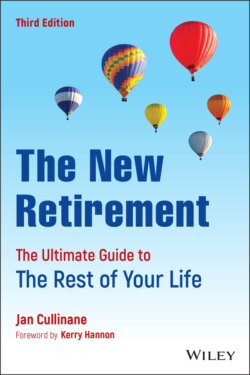Читать книгу The New Retirement - Jan Cullinane - Страница 12
Expectations versus Reality
Оглавление“Work 'til you drop” – that is the professed retirement plan for a number of people, whether it's because they love what they do, they need the money, it's something with which they are familiar, it's easier to avoid change, or some combination of these. But retirement can happen whether you're ready or not. Some professions have mandatory retirement ages, including airline pilots, firefighters, FBI agents, and certain judgeships. In other cases, people are unexpectedly downsized, “right-sized,” need to retire to care for an aging parent, they or their spouse or child have an illness, the business changes, or a calamity (such as Covid-19) hits.
There is a disconnect between what many people think will happen and what does happen regarding retirement timing. I refer to it as expectations versus reality. Each year, the Employee Benefit Research Institute (EBRI) publishes a “Retirement Confidence Survey.” The 2020 version, which surveyed more than 2,000 workers and retirees in January 2020 (prepandemic), offers important insights. For example, looking at recent retirees' experiences:
They expected to retire at a median age of 65; they actually retired at a median age of 62.
31% expected to retire at 70; only 6% actually worked until the age of 70.
Only 11% planned to retire before age 60; 33% retired before age 60.
18% planned to retire between 60 and 64; 37% actually did retire during that age range.
48% left the workforce earlier than planned.
The results have been consistent over the years – many of us think we will work longer than we actually do (the EBRI has been doing this annual survey for 30 years). We may get another job or start another career, but it's important to know the reality versus the expectation. Speaking of which … the EBRI looked at this statistic, too, and found that 74% of retirees planned to work for pay in retirement; but only 24% did work for pay in retirement. As Antoine de Saint-Exupéry said, “A goal without a plan is just a wish.”
What did the 2021 EBRI survey of more than 3,000 Americans during the pandemic show? The median expected age for retirement was still 65, and the actual age was still 62; 23% of retirees said the pandemic made them “somewhat or significantly less confident they will have enough to live comfortably throughout retirement.”
